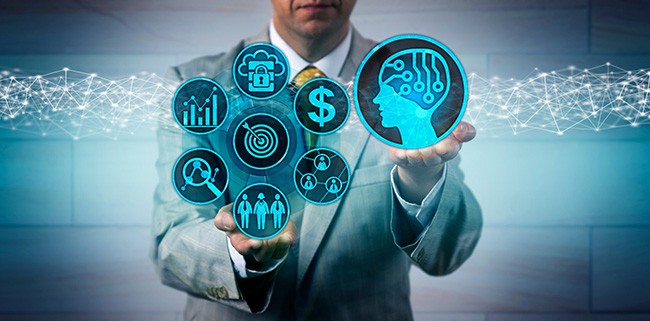Artificial Intelligence (AI) in marketing is the future, and it’s happening now. In this complete guide, you’ll learn how to apply artificial intelligence to your marketing efforts to increase customer engagement, drive conversions, and improve customer experience. This post will provide a practical overview of AI and some examples of AI-powered applications that marketers are currently using.
What makes this article different? It includes a complete guide on what AI in Marketing looks like – from its definition to actionable tactics for success!
What is Artificial Intelligence?
AI can be defined as the ability of a machine to mimic human behaviour and think like humans. It’s been developing rapidly over the past few years with exponential growth due to its usefulness across various industries, including but not limited to healthcare, finance, retail etc.
Artificial mathematics is being applied at an increasing rate of speed every year, and more people are becoming experts on the topic every day. Gartner has predicted that by 2022, AI will replace about 33% of data analysts in marketing. It seems only natural that artificial intelligence continues to grow exponentially until there are virtually indistinguishable systems from our brains!
What is Deep Learning?
AI is not a new concept. The term deep learning was first coined in the 1960s. It refers to deep artificial neural networks composed of many processing layers for analyzing complex data sets. Each layer performs different transformations on its input before passing as output to other nodes within the network. Deep Learning has been successfully used by companies as diverse as Facebook, Skype, and Google.
What is Machine Learning?
Machine Learning (ML) is a subset of artificial intelligence. Machine learning algorithms make predictions or decisions based on massive data. We can figure out the machine’s decision-making process by examining how it “learns” from its inputs.
Impact of AI in Digital Marketing
AI Marketing can offer considerable benefits for marketers like maximizing revenue, conversions, and customer experience. According to a recent PwC study, 72% view AI as a “business advantage.”
AI has a significant impact on marketing with AI-powered applications that big brands are already using to drive their marketing strategy. It helps them to drive engagement with customers while improving customer experience.
AI in Email Marketing Automation
Marketers are always looking for ways to improve their marketing. AI has developed into a powerful tool in the marketing world. Many marketers are using ML and ML algorithms to increase customer engagement, conversions, and customer experience.
One way ML is being used is in email marketing automation software. Many companies use machine learning algorithms to analyze the contents of emails they are sending out and the recipients’ reactions, engagement, and behaviour patterns to create more personalized emails that will increase reply rates- targeting customers with personalized offers based on their preferences.
A machine learning algorithm can also be used for email content personalization- such as by providing a suggestion for an article or video related to the contents of the email.
In addition, you can use ML to analyze customer behaviour patterns and increase engagement. Machine intelligence can automatically adapt future emails based on customer behaviours, such as looking at what links customers clicked in their previous emails and the friends they follow on social networks.
AI Makes Marketing Automation More Intelligent
AI in marketing automation is changing how marketers target their customers and has enormous potential for making customer experiences better by understanding each individual’s preferences.
* Artificial intelligence and ML algorithms make predictions or decisions based on massive amounts of data. A predictive analytics model is trained by machine intelligence to identify patterns within a large data set and make predictions about what future trends will look like. Companies use these predictive analytics to identify trends, risks and customer behaviours.
* AI has significant implications for marketers. It makes decision making quicker than ever before with the use of ML algorithms to deliver real-time insights
* One way that artificial intelligence is being used in marketing is through email marketing – using machine learning algorithm to analyze what emails are sent out as well as recipient reactions, engagement, behaviour patterns etc. which will help create more personalized messages with a goal increase reply rates (offer suggestions related to recipients content)
* Another example where you can use AI in marketing is through email content personalization by providing a suggestion for an article or video related to the contents of the email based on customer preferences
* AI and ML also have significant implications in increasing conversion rates which you can do simply by tailoring future emails with behaviour patterns that are most likely to convert (machine intelligence will automatically change these algorithms according to consumer activities)
AI in Marketing makes Automation More Intelligent. AI has been considered the next big thing for some time now. With ML algorithms generating better customer insights by the day, it seems like it’s going to stay that way!
AI and human error – A Broadly Discussed Topic
There is an expectation that AI will replace human predictions, forecasts, or decisions in the not too distant future. Leading companies such as Google expect AI to answer any question posed in natural language, outmatch the best human chess player, drive a car safely better than any human driver, and translate languages more accurately than any human being.
Google’s Director of Engineering, Ray Kurzweil, said that AI would match the capabilities of humans around 2029. However, only 22% of AI professionals surveyed by Gartner believe this prediction – 84% think it will take longer than 2029 for AI systems to reach near human-level intelligence.
It is a fact that artificial intelligence will change the way humans work and live in society. AI can replace human decision-making in many ways. AI systems may take over human jobs, leading to unemployment or wage stagnation for those who lose their jobs. Professor Gary Marcus of New York University’s psychology and author on machine-learning has criticized this: “I don’t know how we put moral value into machines.”
There is a need for new skillsets that involve creativity, emotional judgment, entrepreneurship, etc. These are areas where AI cannot replace humans just yet. Artificial intelligence will inevitably be able to perform functions that were previously the exclusive domain of humans. Still, it is not able to anticipate and adapt as well as human workers can.
AI will not replace jobs in the traditional sense with artificial generalist robots. Instead, AI will change society by accepting new tasks that artificial intelligence is better at than people. The future workplace will involve more collaboration between man and machine – a need for some form of symbiosis.
Chatbots
Chatbots are systems that use AI to simulate interactions with humans. They can learn from their interactions with humans through artificial neural networks that develop over time (e.g. extracting patterns, making connections). Chatbots become smarter by connecting more information about customers’ needs and wants. This is a sign that artificial intelligence has no limits.
Since its inception, NLP technology has been used to develop chatbots. Natural language processing allows AIs to understand the phrases that users input during conversations and then generate replies based on context clues. Chatbots also use ML algorithms to “learn” new things via observation without being explicitly programmed to do so.
Chatbots can be used for AI marketing by creating personalized messages or assisting customers directly with their queries without a human customer service agent on call.
Personalized messages have a greater chance of being responded to by the recipients of these messages than generic messages, often increasing reply rates and conversion rates. Chatbots can also answer questions more accurately than a human customer service agent would because they do not make errors like misunderstanding an acronym or forgetting about something important. A chatbot might not always have all the answers. Still, artificial intelligence will answer many of the questions that a human customer service agent cannot.
Chatbot technology is now being applied across many industries; it doesn’t just have to be limited to artificial intelligence in digital marketing!
The future workplace will involve more collaboration between man and machine – a need for some form of symbiosis. AI will change society rather than replacing jobs, meaning new skillsets are required, which is why we see artificial generalist robots (AI) taking over tasks from humans but not jobs themselves as AI cannot replace emotional judgement, creativity etc., something machines lack at present. Chatbots often perform better than humans in customer service and marketing because AI can work 24/365.
AI and Data Security
AI has been considered the next big thing for some time now. With ML algorithms generating better customer insights by the day, it seems like it’s going to stay that way!
With ML algorithms being used on email marketing and customer behaviour patterns to increase engagement, conversions, and improving customer experience, machine intelligence often comes with concerns around data security. To make ML work, you need data to train the models. As ML becomes more prevalent, it will only increase the number of records of personal data that is being collected and stored by companies. Securing this data is vital as someone can use it to facilitate identity theft or social engineering. Fraudsters could exploit the data for their gain.
Besides using machine intelligence for marketing automation purposes, ML algorithms are also commonly used in fraud detection and machine vision (such as self-driving cars).
Artificial Intelligence in Marketing has the potential to change how marketers target customers. It can improve customer experiences by understanding individual preferences through predictive analytics. All this while adhering to GDPR guidelines.
How is AI Changing Marketing as We Know It?
The rise of AI has significant implications for marketers. It has made it easier for AI to deliver real-time marketing insights based on customers’ preferences and previous behaviour. This means marketers can now make decisions in seconds that would previously have taken hours, days or weeks of work!
In 20 years, AI will be indistinguishable from human brains! Artificial intelligence is being applied at an increasing rate of speed every year, and more people are becoming experts on the topic every day. It seems natural that artificial intelligence continues to grow exponentially until there are virtually indistinguishable systems; from our brains!
AI marketing will make it easier for marketers, making it possible to respond instantaneously and strategically to changes in demand or other trends. AI can make marketing more efficient as computers can quickly complete tasks that would be very difficult, if not impossible, without the aid of AI.
Benefits of Artificial Intelligence
* AI can help you find personal connections with your audience by analyzing their behaviour and interests over time.
* You can use AI to get a complete view of each potential customer’s journey – from when they first interact with your content until the point where they convert into buyers.
* AI can help you create personalized customer experiences by targeting the right person with the right message at just the right time.
* AI marketing makes it easier for marketers, making it possible to respond instantaneously and strategically to changes in demand or other trends.
* AI is a way to make marketing more efficient. Computers can quickly complete tasks that would otherwise be very difficult or impossible for humans without the aid of AI.
* AI helps you drive your ROI up by at least $12.25 for every dollar spent on AI marketing and customer acquisition campaigns. Artificial intelligence can help marketers identify the ROI on every dollar they spend.
What are some examples of AI in marketing?
In this day and age, AI marketing is used by major companies to gain an edge over their competition.
AI has been used by major companies like IBM Watson, which uses natural language processing to interpret your questions about company services. This AI bot can answer many customer service requests that human agents cannot easily handle because they require specialized knowledge – often including emotional judgement.
Google also employs AI for its advertisement program. Users can enter a query, and AI algorithms automatically select the most relevant ads to display. It can deliver targeted ads because it analyzes the user’s web browsing history, location, search query, and other factors.
Amazon employs artificial intelligence to analyze all of the data associated with its products. Based on this analysis, it can provide personalized recommendations for your next purchase – something that would be nearly impossible without AI.
Starbucks uses AI to make customization more effortless and less time-consuming for their consumers. They use AI in the form of a chatbot on Facebook Messenger that can answer customer questions about products or coffee beans, saving customers from having to wait on hold with an agent who may not provide the answers quickly enough.
Nike uses ML algorithms to design future products and deliver product recommendations. Machine learning is AI that can learn from data without being programmed. A Nike designer might upload a sketch of a new shoe. The artificial intelligence takes it and sees the sketches, looking for those with similar features and shapes. The computer model will repeatedly run to determine what works best, based on various factors such as colours or materials. This AI enables Nike to create more designs in less time and has these products available for buyers sooner than ever before.
Challenges for AI Marketing
There are plenty of advantages AI can offer to the digital marketing industry. Still, artificial intelligence has also come with several challenges that will need to be overcome for AI to be fully implemented in marketing.
Training Time and Data Quality
AI programs that are being used today rely on vast amounts of training data to learn associations and draw conclusions – something machines will never be able to do as well as humans because they lack emotional understanding. This means marketers who choose artificial intelligence over human agents for customer service workflows may need more time and quality data to create the necessary training data before their AI responds appropriately with adequate responses.
Resource Availability
Companies may not have enough artificial intelligence specialists available to design AI technologies at a pace matching the demand for these technologies. There will also need to be an investment in AI software, which AI companies have a hard time raising money for. Companies are unable to determine the profitability or scalability potential of AI technologies, which makes it difficult for them to justify investing.
Privacy Issues and Security Risks
There is also a great deal of concern about data breaches, theft or manipulation due to security risks. Marketers need to be careful when using artificial intelligence in digital marketing because it could cause sensitive information to be compromised. This means marketers who employ AI bots for customer service workflows will have increased responsibility for ensuring these programs are secure from hacking attempts by third parties.
What will the future bring?
AI has much potential for marketers – it can increase engagement with customers, drive conversions, improve customer experience etc. You can use artificial intelligence to make predictions about what customers want before they know it themselves.
In Conclusion
If artificial intelligence is implemented in new and creative ways, it could be the next big thing for marketers. Marketers need to keep an eye on AI marketing trends in order to understand how emerging artificial intelligence technologies will affect their marketing strategies moving forward. AI can help increase customer engagement, drive conversions and improve customer experience – but only if you know how to use this powerful tool effectively!



